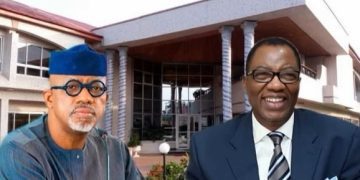The bulk of views expressed by many Nigerians on social media platforms have focused on police brutality, particularly the manner of Farotimi’s arrest. In a clear indication of how mundane Nigeria’s mainstream media have become, many in the mainstream media, such as Reuben Abati and his team at Arise TV, also spent considerable time discussing the issue as a ‘freedom of expression’ issue or the need for Babalola to address the public rather than resorting to the court. While the uneducated or poorly educated public can be pardoned or tolerated for demonstrating a lack of legal knowledge, Nigeria’s mainstream media have abdicated their agenda-setting role to social media advocates by asserting—and thereby miseducating the public—that tort is not a criminal offense; hence, Farotimi’s arrest was uncalled for.
By Bukola Oyeniyi
The ongoing legal dispute between Afe Babalola and Dele Farotimi has brought to the forefront critical questions about libel, self-publishing, and the responsibility of individuals—especially activists and writers—toward upholding ethical standards in their work. While the case centers on a clash between two prominent figures in Nigerian society, it also touches on broader issues concerning the intersection of law, publishing ethics, and the protection of reputations. This essay explores the legalities surrounding libel, the claims made by both parties, the relationship between them, and the implications of self-publishing, drawing from both legal perspectives and personal experiences to provide a comprehensive analysis.
The Issue of Libel in Nigeria
Libel is a legal term used to describe the act of defaming someone’s character through written statements. Under Nigerian law, libel is not only a tort (a civil wrong) but, in some cases, a criminal offense. Section 373 of the Nigerian Criminal Code Act states that any person who publishes defamatory matter intending to harm another’s reputation is guilty of a criminal offense (Criminal Code, 1990). This is a significant provision, as it emphasizes the potential harm that defamatory statements can cause, particularly when they impinge upon the reputation of individuals or institutions of high standing, such as lawyers, politicians, judges, or courts.
Afe Babalola, undoubtedly a respected Nigerian lawyer and philanthropist, has accused Dele Farotimi, a human rights activist, of defamation through Farotimi’s book, Nigeria and Its Criminal Justice System. In his petition, Babalola claims that Farotimi made serious and unfounded allegations about him, which have not only tarnished his personal reputation but also impugned the integrity of the Nigerian Supreme Court. As an individual with significant standing in the Nigerian legal community, Babalola argues that the defamatory statements have caused him considerable harm and have the potential to escalate the matter into a more serious public and legal dispute. According to the petition, these claims are not just personal but carry implications for the judicial system as a whole, highlighting the far-reaching impact of libel on both individual and institutional reputations.
Dele Farotimi’s Assertions
Dele Farotimi, in his book, makes a series of allegations against Afe Babalola, some of which are particularly egregious and have drawn Babalola’s ire. Farotimi, known for his vocal criticism of government practices and legal systems, asserts that Babalola’s influence in Nigeria’s legal circles is rooted in questionable practices and affiliations. He suggests that certain judicial outcomes, including decisions involving the Supreme Court, have been compromised due to personal interests and political connections. Such claims, if proven false, could be construed as defamatory under Nigerian law.
As noted in Babalola’s petition, Farotimi made the following assertions about Babalola and members of his law firm, the Lagos State judiciary, and the Supreme Court:
“That Aare Afe Babalola corrupted the Supreme Court to procure a fraudulent judgement in the service of his client” See page IX.
“That Aare Afe Babalola, Olu Daramola, Olu Faro and the law offices of Afe Babalola & Co, (Emmanuel Chambers) compromised the Supreme Court and the remaining semblance of integrity it might have had when they went back to the Supreme Court and got the Court to swim in the sewer of corruption and shameful self-Abnegation”. See page X
“That Afe Babalola libeled me and the fact of the libel became known to me in a suit against Lawal Pedro SAN”. See page X.
“That I sued Afe Babalola SAN for libel and he leveraged his influence in the Judiciary to deny me justice”. See page X.
The case of Afe Babalola versus Dele Farotimi highlights critical issues surrounding libel, self-publishing, and the ethical responsibilities of authors. While Farotimi’s intentions may have been to critique corruption within the Nigerian legal system, the manner in which these critiques were presented has raised serious legal concerns. Babalola’s decision to pursue legal action, accusing Farotimi of defamation, is a reminder of the potential consequences of publishing unverified, unsubstantiated, or defamatory material
“That I have always been familiar with the fact of our perversion as a People and I have few illusions about equity and justice reigning in Nigeria but I had always assumed that there were lines that should never be crossed. I have however been slapped awake by the brazenness of the judicial brigandage unleashed on hapless citizens, corporate, and individuals by the Nigerian Supreme Court, acting under the direction of Aare Afe Babalola. At least five Justices of the Apex Court have been identified as guilty of odious corruption and or gross incompetence. Either is sufficient to have them removed from their office and this is my petition to the Nigerian people and most definitely to the NJC”. See pages 10 to 11.
“The first we knew of the magic been put together by Afe and his elves must have been around the middle of July”. See page 49.
“While all this was going on, we had a meeting in the law office of Afe Babalola in Magodo, where Olu Daramola SAN made himself unavailable, and had us meet with Olu Faro, a younger counsel……..but Olu Faro Esq was remarkably insolent and assured that we were made aware of just how powerful the law office he worked for believed itself to be and how much above the law and the practice of law they believed themselves to be”. See page 52.
“The judgement of the court was unanimous in giving judgement to the Eletus………But Justice Rhodes-Vivour laid a foundation for the fraud that was to come. He spoke of an unextinguished equitable interest in 254 hectares”. See page 52 to 53.
“ We quickly realized that the law office of Afe Babalola & Co, Emmanuel Chambers had outsourced the judgement execution to another law office, the firm of S.B Joseph & Co the firm had fraudulently and deliberately concealed the judgement of AKA’AHS and had underlined the words of Justice Rhodes Vivour to deceive and perhaps mislead Atilade or as is more likely, Atilade was always a part of the original fraud”. See page 56.
“But even as Atilade J. played the contrition game, she was already part of the game plan being staged together by the grandmaster of judicial corruption in Nigeria, Afe Babalola. I have come to the conclusion that the required form of the application and her ruling were all part of the insidious plans of Afe Babalola, his band of crooked lawyers and coterie of crooked/incompetent justices of the Supreme Court”. See page 59.
“The battle to quash the warrant opened my eyes to the extent of the rot in the court system and I came to the knowledge of the sickening realities of the systemic putrefaction. The Supreme Court’s Judgement was doctored by the confederation of lawyers in Afe Babalola’s chambers and the law offices of S.B Joseph & Co and the end desired by the confederacy was sought with the active connivance of the head judge of the Lagos Division, Atilade J.”. See page 60.
“As the mountain of evidence in proof of the Eletus’ fraud began to pile up and in view of the order that Atilade had granted quashing the fraudulent warrant that she had issued and as Afe came to realize how useless the original judgement had become, Afe went back to the accomplices at the Supreme Court and this is the only logical explanation for the shameless and brazen review of the fraudulent judgement by the second seating of the court where the justices destroyed whatever doubt one might have harbored of either corruption and/ or incompetence”. See page 64.
“It was around this time we began to hear rumors of a return to the Supreme Court by Afe Babalola and his magical elves and the rumors became real when I got a call from Tokunbo Williams SAN, who informed me of the receipt of a motion on notice before the Supreme Court, seeking to correct an error in the judgement reproduced below”. See page 64.
“But apparently, we had underestimated the extent of the putrefaction of the Supreme Court and the extent of Chief Afe Babalola’s corrupt reaches into the innards of the Supreme Court”. See page 64.
“The quashed warrant of execution became the basis of Afe Babalola latest excursion to the Supreme Court and the error of my acceptance of the Corrupt offer of an exparte application to quash the warrant for “Documentary Irregularity” became obvious to me. I knew before the motion was heard, that the court was working to the conclusion desired by Aare Afe Babalola”. See page 67.
“The Lagos crowd had been snookered into a corner by the exertions of my chambers and we had demolished the original fraud that was hatched before Afe secured the first of the two judgements………..The Supreme Court cannot hide behind the incompetence of counsel as it has a duty to examine its own appalling intellectual indolence, corruption or incompetence”. See page 70.
“But the court as though enthralled by whatever Afe the Circus Master had Promised the Justices, acted with utmost carelessness about the integrity of the court, the interest of the citizens and the State that they had been sworn to protect. The conspiracy was always a step ahead of us because some of the clients mistook key members of the confederacy of friends and helpers”. See pages 70 to 71.
“The Attorney General had been dragged into the matter. The brutal attempt at enforcement of the original judgement against organized estates and corporate establishments had served to galvanize extremely critical and sensitive mass of the affected peoples and this was when Afe Babalola lost his influence on the Eletus and the Lagos Mafia whose original brief to procure enforcement of the judgement became the dominant force in the conspiracy muscling out the Afe gang. With Afe Babalola rendered impotent, Lawal Pedro muscled in on the queue”. See page 71.
“…… she knows more about the case that culminated in the Supreme Court Judgement and she also knew everything that I had known about the Eletus fraud and Afe Babalola’s shenanigans”. See page 76.
“But Afe knew that he could get the Supreme Court to do whatever he wanted and to rule however he asked. Pedro knew this too and he being the original Lagos boy, showed Afe a bit of Lagos magic. Afe Babalola and the Eletus might have killed the buffalo but had no way from feeding from the carcass. We have turned the corrupt triumph at the Supreme Court into a pyrrhic victory and it was at this point that Pedro craftily inserted himself into the plot”. See page 80.
“If Afe Babalola might be likened to the lion, Lawal Pedro and the Lagos gang are the originally Africa wild hyenas. They literally chased Afe Babalola off his skill. They repackaged the conspiracy, cut the losses and went for the lower hanging fruits”. See page 80.
“This was enough until “eedi” (karma) caught up with Afe Babalola; he dragged Lawal Pedro before the Lagos High Court and the Eletus before ICPC”. See page 81.
“Sometimes in 2016, I started hearing rumblings of some serious fight between Chief Afe Babalola and Lawal Pedro. I was told that Chief Afe Babalola had written a petition to the LPDC, alleging that Lawal Pedro had railroaded his client Gbadamosi Eletu, into an agreement that circumvents his own legal agreement with the Eletus. About same time, I also heard that the ICPC had been pressed into action against the Eletus, Lawal Pedro and S.B Joseph, which seemed quite incongruous, given the fact that the Eletus were not public officers this event stirred an interest in me. I got my popcorn at the ready and waited to be entertained by the squabbling thieves”. See page 81.
“When Amina Augie JSC railed against Chief Afe Babalola’s professional conduct, or misconduct in the Bayelsa case, she did so either as an ostrich or out of ignorance. Afe has been corrupting the Supreme Court from ages past and had led it to commit the most egregious acts of evil and wanting injustice. Afe knows what her ladyship does not know or pretend not to know: that justice does not live in the Nigerian court or you can get the court to do whatever you want, as long as you know who to speak with and who to pay”. See page 83.
“Afe’s letter to Tunde Phillips, then C.J of Lagos State showed how frustrated he had become about the inability to execute the fraudulent judgement. In spite of the fact that he asked the Supreme Court to do what it had never done before……. the Eletus had formed a new confederacy and had neither room or use for Afe Babalola, who had overestimated his own importance to the plot and failed to discern that he had defectively become unnecessary to the new plotters”. See page 84
“Afe is so enmeshed in his corruption that he has lost all sense of propriety and or fairness”. See page 84.
“I have absolutely no interest in taking Afe Babalola’s corrupt money but I was not going to allow a corrupt, amoral man, devoid of any integrity, to define me for posterity when none of us will be around to dispute the hagiographic account of the event”. See page 84
“Afe Babalola was imperial by the suit I filed in court it was designed to blow open the tawdry details of his dirty deals with the Supreme Court…….it was a thing to be having a quarrel among thieves, each knew how far they might push their claim but it is quite another thing to get into “roforofo” fight with a man seemingly incapable of walking way from a fight”. See page 85
“The perils that were been faced by all key members of the twin camps of conspirators………I must close with a caveat; I am not privy to what happened in the conclaves of crooks….” See page 85
“But there was a second incentive. This was the promise to get rid of the nuisance that my libel suit against Afe represented. I knew when I knew when I was filing the suit, that Afe was not in a position to ever defend the suit. He has no defense and he never anticipated that I will ever become aware of his libel and if he did, he wasn’t concerned about what a mere mortal like me could do to a god like him. Afe was offered assurances that he need not worry about the case. The conspirators had it in hand and would extinguish the fire.” See page 88.
“I sued Afe Babalola because I was always going to blow his dirty, tawdry secrets. I did not know how long any of us had to live and I did not want to be dealing with the idiotic arguments that I could envision, of Afe’s proteges, arguing that I was slandering the dead if the book was to be published after his demise. He is already well in his 80s. I have offered him the opportunity to defend himself. He went to extra ordinary lengths to deny me my day in court”. See page 93.”
Undoubtedly, these assertions implicated not just Babalola, but the Nigerian judicial system in its entirety, questioning its fairness and integrity. While Farotimi may have intended to expose corruption or malpractice, the tone and nature of his claims are what have landed him in legal trouble. According to Afe Babalola, these assertions are not merely criticisms but are defamatory and have resulted in damage to his reputation. The claim that the Supreme Court is involved in such misconduct, in particular, raises the stakes of this case, as it touches on the credibility of the highest judicial body in the country.
In response to Farotimi’s allegations, Afe Babalola has taken the legal route, filing a defamation suit against Farotimi. Babalola’s legal team asserts that Farotimi’s claims are unfounded and have caused significant harm to Babalola’s professional reputation.
The Ethics of Self-Publishing
The bulk of views expressed by many Nigerians on social media platforms have focused on police brutality, particularly the manner of Farotimi’s arrest. In a clear indication of how mundane Nigeria’s mainstream media have become, many in the mainstream media, such as Reuben Abati and his team at Arise TV, also spent considerable time discussing the issue as a ‘freedom of expression’ issue or the need for Babalola to address the public rather than resorting to the court. While the uneducated or poorly educated public can be pardoned or tolerated for demonstrating a lack of legal knowledge, Nigeria’s mainstream media have abdicated their agenda-setting role to social media advocates by asserting—and thereby miseducating the public—that tort is not a criminal offense; hence, Farotimi’s arrest was uncalled for.
While I condemn police brutality, especially in the treatment meted out to members of Farotimi’s chambers, Nigeria’s mainstream media could cover itself in glory by not giving such a secondary matter more attention than either the substance of Babalola’s petition or Farotimi’s claims themselves. Given their importance and order of occurrence, it is strange that the mainstream media in Nigeria gave considerable time to whether Babalola sought to silence Farotimi’s book or cover his alleged misdeeds and criminal collusion over many years. It must also be noted that nothing was raised about the ethical standards followed by Farotimi in his book.
Farotimi self-published his book, and this case raises important questions about publishing ethics and accountability. It must be said that publishing, particularly when it involves serious allegations against well-established individuals or institutions, must adhere to rigorous standards. As someone with vast experience in the academic and professional spheres, I cannot help but note that reputable publishers, as a matter of rule and practice, subject manuscripts to peer review and, sometimes, legal scrutiny to ensure the accuracy and integrity of their contents. In contrast, self-publishing, as seen in Farotimi’s case, can sometimes bypass these important safeguards, potentially allowing unverified or inflammatory material to reach the public.
Self-publishing has become increasingly popular, especially in an age where digital platforms provide authors with the tools to bypass traditional publishing routes. However, self-publishing also comes with its own set of challenges, particularly regarding ethical responsibility. As the publisher, the author bears full responsibility for the content, meaning that any legal or ethical issues surrounding the work fall squarely on their shoulders.
As the above excerpts from Farotimi’s book quoted in the petition show, one cannot help but notice that there is a lack of formal review in Farotimi’s self-published book, as many, if not all, of the claims, need additional evidentiary material to support their inclusion in any text. The point is that reputable publishers—whether academic or commercial—enforce strict standards of ethical publishing. These standards include peer review, fact-checking, and legal vetting, which are designed to protect the interests of the writer, the subject of the work, and the publisher.
As someone with over 25 years of writing and publishing experience, I can attest to the importance of ethical publishing practices. Throughout my career, I have never encountered a reputable publisher willing to accept content that could be considered defamatory or ethically questionable. A book that makes serious claims about a public figure or institution must undergo rigorous scrutiny before being published. In my own work, I have ensured that manuscripts are reviewed not only by subject experts but also by legal professionals to safeguard against potential legal issues. The failure to adhere to such standards in Farotimi’s case raises valid concerns about the integrity of his work and the potential consequences of its publication.
The Relationship Between Afe Babalola and Dele Farotimi
The relationship between Afe Babalola and Dele Farotimi is an important backdrop to this case. Although both men occupy prominent positions in Nigerian society, their personal and professional relationships have been marked by tension, particularly in recent years. While they may have shared common ground in the past, Farotimi’s outspoken criticisms of the Nigerian legal system and its figures, including Babalola, suggest a growing divide between them.
It is crucial to understand the dynamic between these two individuals to assess the motivations behind the defamation suit. As the petition reveals, both Babalola and Farotimi were involved in several cases, and the courts resolved these cases in favor of Babalola. By law, a lawyer, and even litigants, reserve the right to disagree with the rulings of a court and could, as a matter of fact, resort to appeal. However, when all avenues for appeal have been exhausted, any adversarial actions or pronouncements that are injurious to either the case or the court can be contemptuous of the court. It is therefore needless to say that some of the excerpts quoted from Farotimi’s book could be deemed contemptuous of both the case and the court and not Babalola alone.
It is common knowledge that Farotimi, as a human rights activist, often positions himself as an advocate for the downtrodden and an adversary of powerful elites. Babalola, on the other hand, is a well-established figure within Nigeria’s legal establishment. The clash between these two men could be seen as part of a broader ideological battle, one that pits Farotimi’s criticisms of the system against Babalola’s support for its institutions.
However, this does not excuse any potential harm caused by defamatory statements. As stated earlier, even human rights activists are not immune from legal accountability when their claims have the potential to damage the reputation of others. In this case, the severity of Farotimi’s allegations against both Babalola and the Nigerian judiciary has created a situation where the boundaries between activism and defamation become blurred.
Conclusion
The case of Afe Babalola versus Dele Farotimi highlights critical issues surrounding libel, self-publishing, and the ethical responsibilities of authors. While Farotimi’s intentions may have been to critique corruption within the Nigerian legal system, the manner in which these critiques were presented has raised serious legal concerns. Babalola’s decision to pursue legal action, accusing Farotimi of defamation, is a reminder of the potential consequences of publishing unverified, unsubstantiated, or defamatory material.
In the context of self-publishing, the case also underscores the need for authors to adhere to ethical standards of publishing. Reputable publishers serve an important function in ensuring that the content they release is both factually accurate and legally sound. Farotimi’s self-published book, which bypassed these checks, may have inadvertently exposed him to legal liability. As writers and activists, it is crucial to recognize the weight of our words and the responsibility we carry when we publish content that may harm others’ reputations. In the pursuit of justice, caution and accountability should always prevail.
References
Criminal Code Act, LFN 1990, Cap C38, Laws of the Federation of Nigeria.
Smith, M. (2016). Defamation and the Law. Oxford University Press.
Williams, P. (2018). Libel, Defamation, and Media Law: A Critical Overview. Routledge.
Bukola Oyeniyi
Bukola Oyeniyi is Associate Professor of History at the Missouri State University. His research expertise is on the social and cultural history of Africa, specifically internal migration and human development, social conflicts in composite societies, terrorism, and dress and identity in Yorubaland. He is the author of “The History of Libya” (2019), “Dress in the Making of African Identity: A Social and Cultural History of the Yoruba People” (2015), “African in Focus: Nigeria” (co-authored with Toyin Falola, 2015), “Culture and Customs of Libya” (2012), etc.
•Opinions, thoughts or positions expressed here are personal and strictly of the writer/author and not The Daily Crucible.









































Based on the above issue surrounding Dele Farotimi and Afe Babalola what are the publishing pitfalls in editing